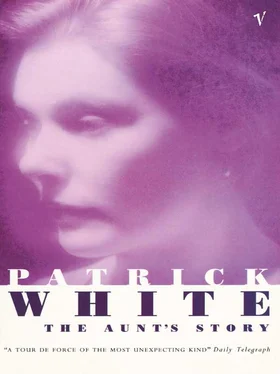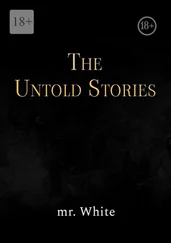‘Wetherby cannot resist the telling of fortunes,’ Lieselotte said. ‘To tell his own fortune in other hands. He is the original interpreter of mirrors. Am I not right?’ she said, turned.
‘You are always right,’ said Wetherby.
But he did not propose to investigate the degrees of hate. Sun destroys self. For the moment he could accept his nothing. He wondered also, a little, at the hot skin, purple-stained, which had just escaped from his own hand.
‘Katina! Come on, Katina!’ Miss Grigg commanded. ‘It is your duty to see that guests are supplied with paper napkins and cardboard plates.’
‘Of course,’ Katina said.
She took from her skirt the hand that she had held clenched to contain her secret, and which, spread for a fortune, would have palpitated like a leaf.
Theodora put stones, one at each corner, to hold the tablecloth. It was a neat, solemn duty that she liked. There was a bounty hinted at, and a shape, even if ultimately unachieved by human intercourse. Man’s machinery fails, she suspected, beside the more sinuous reasoning of the waves. She heard the crimson protest of Mrs Rapallo’s parasol drowning in blue, and blue, and still deeper blue.
‘My eyes are not made for this,’ complained Mrs Rapallo. ‘I cannot see. What do you suppose has happened, Theodora Goodman? When I was a girl I could see the gum oozing out of bark. I could watch the red cabbage bugs playing at love. The sun was a ball of fire, at which I could stare without fear or discomfort.’
It is from long looking at a wall, Mrs Rapallo, Theodora would have said, but refrained.
So Mrs Rapallo sulked, and her eyelids oozed, and she tilted her parasol at the sun.
‘Let me press you to a sandwidge, Mrs Rapallo,’ coaxed Miss Grigg. ‘Or a croaky de poison . There’s nothing like food. And sea adds salt.’
Miss Grigg’s enthusiasm ran red under her white twill.
‘Picnics,’ she said, ‘are nice. When I was with the family of the late Colonel de Saumarez, M.B.E., at Winchester, picnics were the order of the day. We used to take our lunch into the forest, to Lymington. The late Colonel was a jolly man. ’E could tell a tale like nobody’s business. No one had shot so many tigers, or stuck such pigs, or ’ooked such wopping sharks. I was devoted to ’is kids, Lilian and little ’Enry, though ’Enry went to the pack.’
Miss Grigg fanned a fly away from the niceness over which she presided by right and nature, the egg sandwiches and sausage rolls, the chicken wings and pale aspic prawns. But nastiness always dares. So she frowned, and shooed, and protected the cloth, where her soul lay sliced and open on a cardboard plate.
‘Yes. Poor little ’Enry. ’Enry was a love. Used to like to chase the pigs. ’E said the pigs wore combinations. Would you believe it! At Lymington, of course, the wild pigs were tame, not like the ones the Colonel stuck abroad. And Lilian sat beneath the trees, as nice as nice. Lilian was lovely. She took a lord, and turned stout in the end. But what ’appened to ’Enry is something we shall never know. First ’e blows ’is fortune, then ’is brains, in a bedroom in Bayswater. All ’e left was a note on the washstand to say ’e was in ’is right mind. Tt-tt-ttt,’ sighed Miss Grigg. ‘Countess, can’t I tempt you to an egg?’
‘Thank you,’ said Lieselotte, ‘I have eaten.’
‘Lord!’ said Miss Grigg squarely. ‘I ’aven’t begun.’
But Lieselotte, Theodora saw, was engulfed in some personal disaster, that was also perhaps little ’Enry’s. Lieselotte read the letter on the washstand written in her own familiar writing.
‘The castle in which we lived was full of such events,’ said Lieselotte. ‘They were called a sacred German Pflicht .’
‘And what is this German Flick ?’ asked Miss Grigg.
‘It is something that cannot be explained in any other language. It is a kind of upsurging of the German bowels.’
‘Well I never!’ said Miss Grigg.
‘But I failed to upsurge. Although Rudi handed me the gun himself. He called it the benefit of honour. I couldn’t. Even when he dictated the letter I should write.’
‘Your ’usband was a wrong ’un. Downright bad,’ said Miss Grigg.
Lieselotte fingered bread.
‘Only bread is good, Katina Pavlou,’ said Lieselotte.
Katina Pavlou did not hear. There was no reason why she should. Sun had undone her bones. Her body had learnt a suppleness of water. Suddenly she bent and mingled.
‘You are not eating,’ she said. ‘You are bored. But the best part is still to come. We have wild strawberries and sour cream.’
She blushed. She would have called him by some intimate name, touching without hands. But since discovering in a book that he was called Lionel Aloysius, she blushed. She was ashamed for him.
‘I?’ Wetherby asked.
He was not altogether sure. He turned his face. Now the sun was suspect.
Theodora Goodman smiled, knowing that for Wetherby the truth resided in Birmingham. She also heard the squirming of the paper rose. If I am to take and break this child, Wetherby would have said, the suffering will not be mine.
‘I was thinking,’ Wetherby said.
‘Of what?’ Katina Pavlou asked.
Oh, well, he supposed, if it was to happen.
‘I was thinking,’ he said, ‘that I had not noticed the two brown moles on the lobe of one of your ears.’
This is so easy, he said. He smiled at the sea. But it was not Wetherby. He smiled for the clerks in parks who expose themselves regularly, in words, on benches.
Katina Pavlou touched the crumbs. ‘I hate my moles,’ she said.
‘But they are so right, Katina Pavlou.’
Wetherby, speaking the right words, could read the smile on Lieselotte’s face. It was his own scar, his own hatefulness.
‘I hate my moles,’ Katina Pavlou said.
As if she could not love enough all that lived and breathed. Theodora knew Katina Pavlou’s smile. Trees sprang suddenly from rocks and sand, the first trees. Her arms parted the waves. Katina’s face had opened, Theodora saw.
Mrs Rapallo cleared her throat, from a long way down. She stirred. She touched her orange rock, groping for the plush that was not there.
‘Moles can be removed,’ Mrs Rapallo announced. ‘With an electric needle. Painlessly. I remember Maxine Bosanquet had one in an awkward place. Otherwise she was perfect. Maxine was famous for her skin. And pearls. Pearls seemed to feast off her. Many of us lent her our necklaces to be refreshed. What a glow they returned with! I was always death to pearls,’ Mrs Rapallo said.
She shook her shoulders for some unpleasantness, both far and close. She felt, and turned. Painfully prizing open her eyelids, she looked and said, ‘I guessed as much. The monster is approaching. After all.’
‘Why, yes, it is the General,’ said Katina Pavlou.
Under a handkerchief that he had knotted into a cap, the General flamed. The air was full of displeasure, Theodora heard, as he sweated closer through the trees. Twigs were snapping. Sand slurred. The rock suggested great gurglings of subterranean water, as if the sea were protesting in the belly of the earth. Over his waistcoat he wore, to contain himself, or to celebrate the occasion, an enormous gold chain.
‘General, you are on fire,’ Lieselotte called. ‘Come, and we shall put you out with crushed strawberries.’
‘I am in no condition,’ wheezed Sokolnikov, as he pressed between the last trees.
‘At your age you should take care,’ said Lieselotte, quietly squeezing the head off an ant.
He heard. He stood on the edge of the clearing, handling himself tenderly. He was conscious of his ridiculousness. For a moment Theodora feared that, possessed by some demon of jollity, Sokolnikov might crow. If he had lost his paper nose, the cap was still knotted on his glistening fat.
Читать дальше












